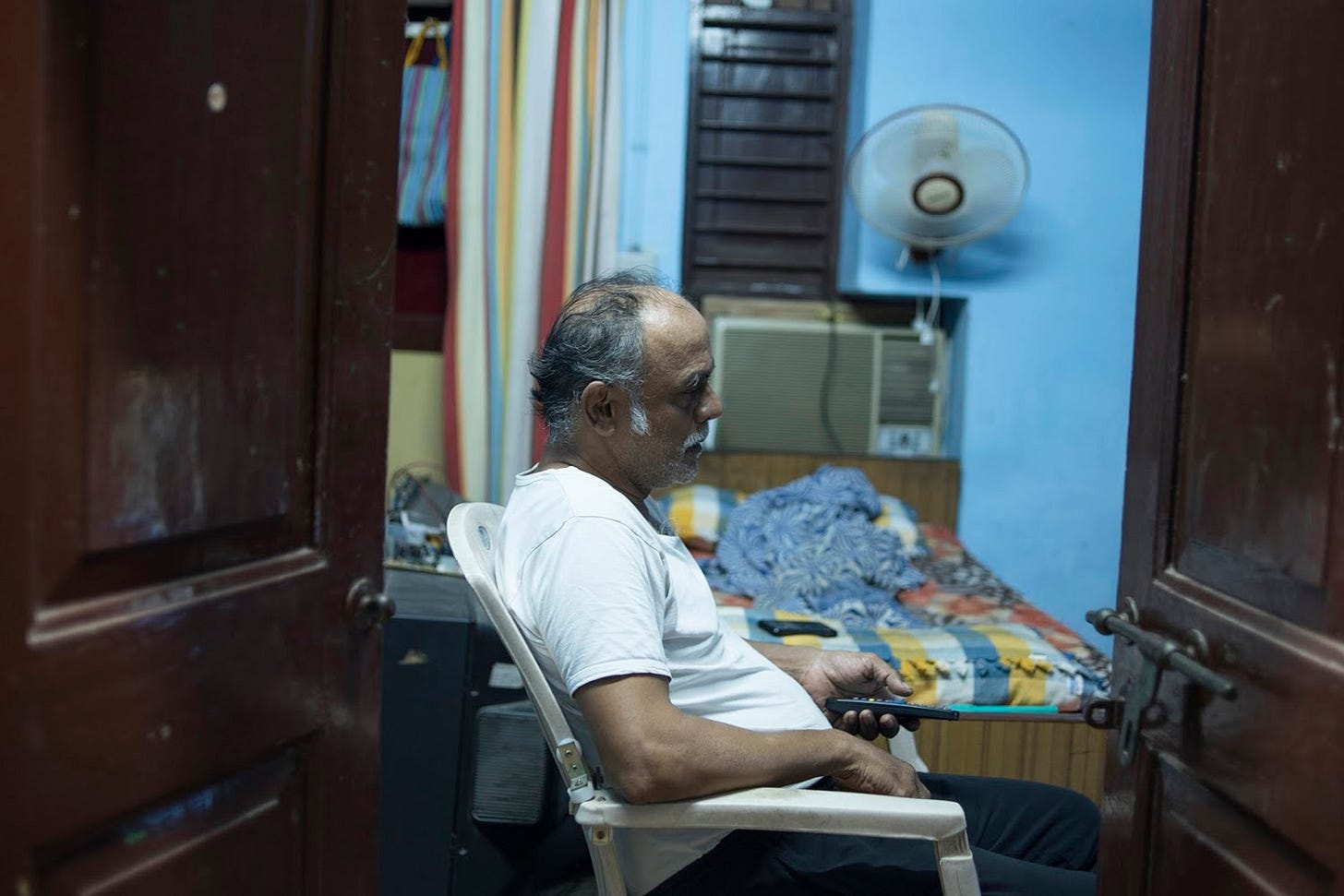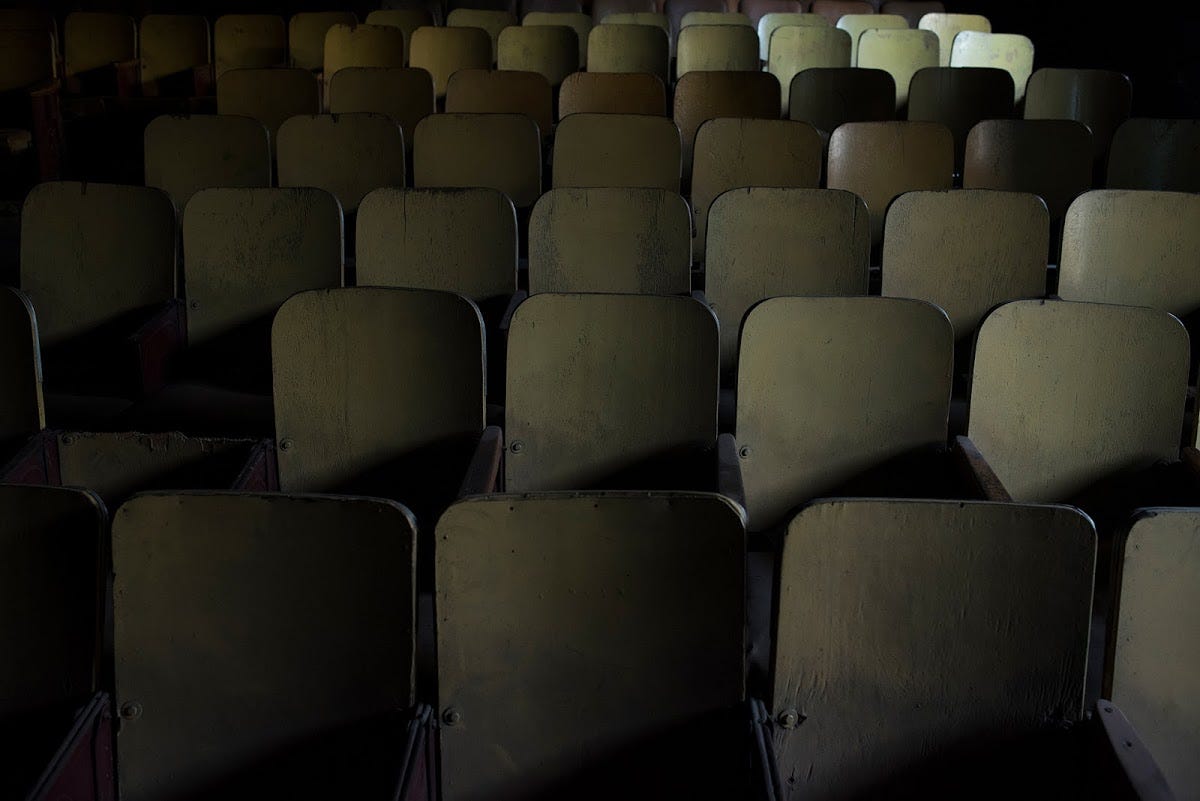On Intellectual Cinema
The 2012 film Ship Of Theseus made its characters into thought experiments. What happens if we have characters who live their life like manifestos?
The first time I watched a film with an “open ending” in the theater, I refused to believe the film had gotten over. I stood with my brother in the theater lounge hoping the usher would call us back in after, what I assumed, was a second interval. No such luck, and that was the first bitter taste of the lack of narrative catharsis. How do I know what to feel about a film if the film isn’t complete?
Cinema’s role growing up was primarily, if not entirely, entertainment. It was the extension of the soap operas I would watch at night, which provided company for dinner. Narrative catharsis was important, with character arcs completed, even if it involved dead characters coming back to life, irrational face-lifts, and awfully staged moments of love, betrayal, and rape. (I am using the word awful in retrospect. I didn’t watch these shows then, with that layer of criticism. It was pure engagement, unworried about social messaging, aesthetics, and narrative flow. Partly, it was the meme culture of the late 2010s that made me revisit nostalgia with a veneer of cringe. The meme culture, a revolution of the visual media since perhaps Altamira and Bhimbetka, twisted nostalgia, then commodified and democratized cringe, making it almost a raw material. And that means mining deep into the archives for awful moments that we can remix and rework into a final, viral package.)

Cinema was also an excuse to watch beautiful people on screen. I used to drag my mother to the theaters just to watch beautiful people perform beauty together. In cinema, for me, beauty was enough; a lesson I learned early on. So many queer folks mention their first sexual awakening through characters on television and the movies. The erotic potential of cinema and television that emanated from its beauty—what makes it memorable—is often relegated to inferior readings. (Pauline Kael, the New Yorker film critic however understood the potential of this reading; all her books of collected reviews reek of double meaning—Kiss Kiss Bang Bang, I Lost It At The Movies, When The Lights Go Down. She even wanted to review Deep Throat for the New Yorker, but that didn’t come to pass.)
Then came Ship Of Theseus, an indie film in 2012, that put all the intelligent directors of Indian cinema in an existential tailspin. It’s a philosophical film that is tactile, visual, and unlike Terrence Mallick’s meditations, entertaining. And for the first time I remember watching a film that moved me to think consummately about abstract ideas of selfhood and society. (You can watch the full film here)
The Paradox Of Theseus
The writer and director Anand Gandhi mapped the paradox of Theseus to the human body: If we replace parts of an old ship to make a new ship, is the new ship still the same old ship? And if we use the old parts to make another ship, is this ship the same old ship? Gandhi uses human organ donation to ask the same question. If I remove my eyes, my kidneys, my liver, and replace them with new eyes, kidneys, and liver, am I the same person? At what point do I stop being me?
The first time I watched the film I was smacked in the face. It had to do with two things—the amount of quotes this film makes you want to remember (“mental masturbation” was a phrase I picked up from here, as was the rationale for my brief stint with veganism), and the feeling of being energized in the mind. That you could talk about a film after the film is over, and perhaps, enjoy the film more in its articulation than in its viewing—this was a new thing for me.
The film had come in the late teenage vacuum of atheism, where we reject god and faith to provide existential answers. In my head, the film provided the answer to the pressing question of who we are and what our “essence” is. Though what that answer was, I had no idea, but I knew there was an answer, and that was enough, then. The fact that the question was stated so reasonably, so visually, glinted the allure all the more. The idea of having an “essence”, a true inner being that the body is a mere expression of, was, perhaps is, so seductive. That we can live our lives like manifestos, was aspirational.
But then we age and the manifesto frays. When people say that you haven’t lived unless you’re a communist at 18 and a capitalist at 32, what they mean to say is the ifs-and-buts of something as rigid as communism doesn’t hold up as we age. That could mean that we either reject the theory entirely for its opposite (like Balraj Sahni, the actor and writer, who was a staunch Marxist, but towards the end of his life he, perhaps, confronted with the potential nothingness of death, took to the Guru Granth Sahib), or we could tweak it around, and tweak us around, like a little ideological dance.
I had recently watched the film again to speak with a friend about it on a YouTube livestream, and my head spun for a second because the thoughts I had now watching were so radically in opposition to the ones I felt back then.
An acquaintance texted me saying he was unable to get through the film because the characters were so verbose and unreal—a blind photographer? a rational monk? a broker with a heart of gold? I told him that maybe if he looks at the characters as thought experiments, as characters who only think, and not feel, he might enjoy the film more.
There is a monk with liver cirrhosis, who refuses to have a transplant because that would involve medicines which are tested on animals. His was the character that propelled me head-first into veganism. He wears a white cloth draped around his body with a duster to sweep the floor before he sits on it, so he doesn’t kill any insect by mistake. He doesn’t travel in cars or trains. If he has to be at the court to fight a case against the medical companies, he leaves his abode at 4 in the morning to walk the journey.
But on his death bed, as his health scrapes the bottom of the barrel, he flips, and decides to take the liver. In the last scene he is seen in a pant-shirt, and not the white cloth he came to associate with him. This was a detail I missed out the first time I watched it. He has survived, but have his beliefs? All we know of him are the verbose catechisms he engages with that challenge his thoughts. If I were to meet Anand Gandhi I would ask him what happens to Maitreya, the monk. When my friend asked me the same question on the livestream I did not know what to answer—for the entire film all we know of this character is what he thinks and believes in. Now, when his beliefs are challenged and he reneges on them, we don’t know what to think of him, because for so long, he was only his beliefs. That is what living like a manifesto does to you. It removes the capacity to be singular, complex, and even contradictory; it removes your capacity to be human.
So could this mean that human beings don’t have an “essence”, an unchanging force of life within? That ships don’t have a specific thing that makes them a ship? That I don’t have a specific thing that makes me Me?
When the blind photographer’s lover is trying to convince her of the beauty of an image, he says he will vectorize it so she can feel the contours of it, and then write a poem to “capture” its essence. The photographer herself uses Suskind’s perfumer, someone who captures scents, as an inspiration to photograph. As if you could capture the essence of a person in an 2-dimensional image. As if a person had an essence that could be captured.
The Buddhist doctrine of Shunyata best exemplifies this. Shunya means nothingness or zero, but it’s also a reaction to the caste-based idea that we have an essence—to be a king or a merchant or a warrior or a servant. Shunyata was the onslaught against casteism and the idea of an essence—nothing has an independent reality, svabhava; all things are dependent and relative, and thus there is a fundamental emptiness when it comes to defining oneself.
The point is, as human beings, anything we say about ourselves, the opposite of it could also be true. And the point of the film, now as I see it, is for us to get to that point by showing us these characters who are so fierce in their thoughts, but eventually, so frayed by life. So instead of asking the question of whether or not we have an essence, maybe we should wonder why the question even matters.
“I guess all art evolves from a need to record the apparent to a need to capture the essence.” — a character in Ship Of Theseus
“It’s so oppressive, this obsession we have for final answers.” — another character in Ship Of Theseus.
Religion
I feel like the essence question was framed very well in Ramy, an auto-fiction that takes things too far in the best, most uncomfortable way possible. Based on Ramy Youssef’s life as a practicing Muslim in America, for whom the success of masturbation and the tragedy 9/11 coincided in reality and in his head, for whom faith became not just a guide, but a crutch. The second season delves deeper into this crisis of faith, where his hedonistic impulses clash with the clothed modesty of Islam.
It depicts what happens to a man so jarred by the contradiction between impulse and ideology. To be a vegan but to crave cheese. To be a Muslim but to crave premarital sex. To be a communist but to crave Cartier. It’s easy to believe early on that we can live our life as embodied manifestos. But reality bruises this, and it makes for an uncomfortable self-reflection. What results is often a train-wreck.
The Function Of Cinema
Perhaps cinema doesn’t have a function, but we as viewers, have pre-conceived notions of its function that we take for granted. Anand Gandhi made me question the function of the medium, like the blind photographer in his film made me question the visual aspect of photography. The photographer organizes an exhibition, and one of the ways to experience it is by touching the paintings, with people thrust into dark rooms feeling their way around a space. Anyone who has been to an exhibit knows that touching art is the worst thing you could do there. Yet Gandhi comes along and says, “See! If art cannot be touched you are removing a sensual aspect of it.” He looks at vectorized photographs and says “What if the primary mode of experiencing a photo is tactile?” And he looks the cinema, a revolution of the 19th Century desire to document, and says, “What if the primary mode of experiencing cinema is the mind, and not the metaphoric heart?”
I turned 25 years old this weekend. I spent the past week going through old photos, blogs, diaries, Google calender and Google photos to see how I spent my birthdays the past years. I wrote me a poem. Why a poem? Because I was struggling with age, hairfall and hope, and as the poet Adrienne Rich said and I paraphrase, that which is under concealment within us explodes into poetry.






This articulation shows you're young and wise, and Happy Birthday.